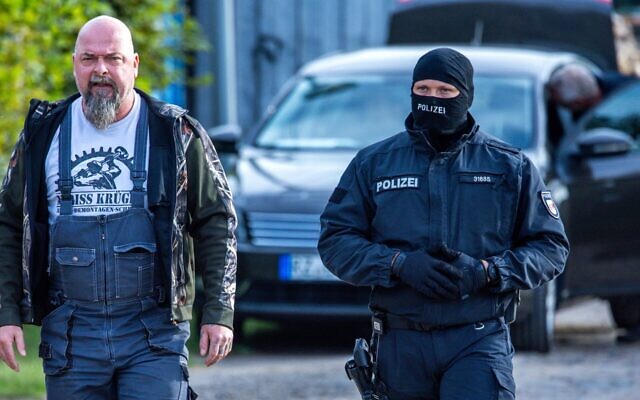Germany bans neo-Nazi group to send ‘signal against racism and antisemitism’
The Hammerskins, a local spinoff of a group founded in the United States in the late 1980s, are accused of promoting criminal activities and of opposing the German constitution.

Germany has banned a neo-Nazi group after raiding the homes of its leaders across the country, in a move the government said “sends a clear signal against racism and antisemitism.”
The Hammerskins, a local spinoff of a group founded in the United States in the late 1980s, are accused of promoting criminal activities and of opposing the German constitution.
According to a recent report from Germany’s Federal Office for the Protection of the Constitution, the group was the only remaining neo-Nazi organisation active nationwide.
“The ban of the Hammerskins Germany is a hard blow against organised right-wing extremism,” German Interior Minister Nancy Faeser said on Tuesday.
“With this ban, we are putting an end to the inhumane activities of an internationally active neo-Nazi association in Germany… This sends a clear signal against racism and antisemitism.”
The German group, founded in the 1990s, reportedly has only 130 known members but is considered influential in the neo-Nazi scene. German police raided the homes of 28 suspected leading Hammerskins members in 10 states across Germany on Tuesday.
It is rare for Germany to ban a political organisation, thanks to postwar guarantees of free speech and assembly. Exceptions occur when an organisation threatens the democratic state, or if it denies or glorifies the country’s Nazi past.
The Hammerskins are reportedly the 20th right-wing extremist organisation that Germany has banned. For example, in 2007, Germany banned Collegium Humanum, its member organisation Bauernhilfe and the Association for the Rehabilitation of Those Persecuted for Denying the Holocaust” as “reservoirs of organised Holocaust denial.”
In 2020, the government banned the groups Combat 18, Nordadler, and Sturmbrigade 44/Wolfsbrigade 44; and in 2021, they banned Nationale Sozialisten Rostock and its spinoff, the Baltik Korps.
But in 2017, to the disappointment of Jewish groups in Germany, the supreme court rejected a ban on the far-right party NPD — the National Democratic Party of Germany, which changed its name this year to “The Homeland” — saying they were not dangerous enough to warrant such an extreme response. The NPD never succeeded in gaining parliamentary seats on the national level.
Meanwhile, the right-wing party Alternative for Germany (AfD) party, founded in 2013, has made continual political headway, reaching the national parliament, the Bundestag, and thus receiving taxpayer funding for their activities and infrastructure.
There have been calls for it to be banned from politics over its anti-immigrant platform and the Holocaust relativisation of some leading members.

Thank you for helping to make Jewish News the leading source of news and opinion for the UK Jewish community. Today we're asking for your invaluable help to continue putting our community first in everything we do.
For as little as £5 a month you can help sustain the vital work we do in celebrating and standing up for Jewish life in Britain.
Jewish News holds our community together and keeps us connected. Like a synagogue, it’s where people turn to feel part of something bigger. It also proudly shows the rest of Britain the vibrancy and rich culture of modern Jewish life.
You can make a quick and easy one-off or monthly contribution of £5, £10, £20 or any other sum you’re comfortable with.
100% of your donation will help us continue celebrating our community, in all its dynamic diversity...
Engaging
Being a community platform means so much more than producing a newspaper and website. One of our proudest roles is media partnering with our invaluable charities to amplify the outstanding work they do to help us all.
Celebrating
There’s no shortage of oys in the world but Jewish News takes every opportunity to celebrate the joys too, through projects like Night of Heroes, 40 Under 40 and other compelling countdowns that make the community kvell with pride.
Pioneering
In the first collaboration between media outlets from different faiths, Jewish News worked with British Muslim TV and Church Times to produce a list of young activists leading the way on interfaith understanding.
Campaigning
Royal Mail issued a stamp honouring Holocaust hero Sir Nicholas Winton after a Jewish News campaign attracted more than 100,000 backers. Jewish Newsalso produces special editions of the paper highlighting pressing issues including mental health and Holocaust remembrance.
Easy access
In an age when news is readily accessible, Jewish News provides high-quality content free online and offline, removing any financial barriers to connecting people.
Voice of our community to wider society
The Jewish News team regularly appears on TV, radio and on the pages of the national press to comment on stories about the Jewish community. Easy access to the paper on the streets of London also means Jewish News provides an invaluable window into the community for the country at large.
We hope you agree all this is worth preserving.





















